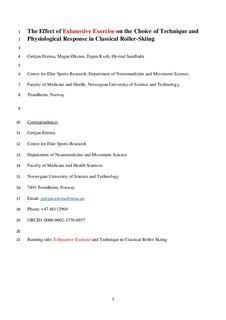The effect of exhaustive exercise on the choice of technique and physiological response in classical roller skiing
Journal article, Peer reviewed
Accepted version
Permanent lenke
http://hdl.handle.net/11250/2583399Utgivelsesdato
2018Metadata
Vis full innførselSamlinger
Originalversjon
European Journal of Applied Physiology. 2018, 118 2385-2392. 10.1007/s00421-018-3965-1Sammendrag
Purpose
The aim of this study was to investigate the effect of exhaustive exercise on technique preference and the accompanying physiological response during classic skiing at constant workload, but with varying incline–speed combinations.
Methods
Seven male competitive cross-country skiers performed four tests, each lasting 23 min, at constant 200 W workload roller skiing on a treadmill using classic style, three in unfatigued state, and one after exhaustion. The incline and speed combination (that determined the 200 W) were altered each minute during the tests. The athletes were allowed to change sub-technique at free will. Physiological variables and cycle rate were recorded continuously as well as the incline–speed combinations at which the sub-technique was changed.
Results
Exhaustive exercise did not (or hardly) affect cycle rate and choice of technique. The physiological response was most prominent in slight incline—high speed conditions, independent of exercise duration. Exhaustive exercise affected the physiological response in a differentiated manner. HR and RER remained, respectively, higher and lower after fatigue, while V˙O2 (and thereby GE) were affected only during approximately the first 8 min of post-exhaustion exercise.
Conclusions
Exhaustive exercise has a minimal effect on choice of technique in classic cross-country skiing with free choice of sub-technique, even though physiological stress is increased.
